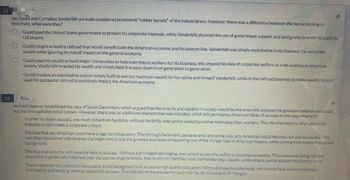Question
thumb_up100%
11,12

Transcribed Image Text:---
### Historical Perspectives on Robber Barons: Gould vs. Vanderbilt
**Question 11:**
Jay Gould and Cornelius Vanderbilt are both considered prominent "robber barons" of the industrial era. However, there was a difference between the two according to historians; what were they?
- **Option A:** Gould used the United States government to protect his corporate interests, while Vanderbilt shunned the use of government support and land grants in order to build his rail empire.
- **Option B:** Gould sought to build a railroad that would benefit both the American economy and his bottom line. Vanderbilt was simply exploitative in his business. He extracted wealth while ignoring its overall impact on the general economy.
- **Option C:** Gould used his wealth to build major Universities to help train future workers for his business, this showed his idea of corporate welfare as a net positive in American society. Vanderbilt hoarded his wealth and simply kept it to pass down from generation to generation.
- **Option D:** Gould created an exploitative system simply built to extract maximum wealth for his rail line and himself. Vanderbilt, while in the railroad business to make wealth, also used his successful railroad to positively impact the American economy.
**Question 12:**
Herbert Spencer established the idea of Social Darwinism, which argued that the most fit and capable in society would be the ones who enjoyed the greatest material and social success in a capitalist social system. However, there was an additional element that was included, which still permeates American ideas of success to this day, what is it?
- **Option A:** In order to obtain success, one must come from hardship. Without hardship, one cannot understand that motivates their workers. This life of poverty is what allows for empathy to permeate a corporate culture.
- **Option B:** The idea that any American could have a rags-to-riches story. That through hard work, perseverance and some luck, any American could become rich and successful. This was often associated with Andrew Carnegie who is one the greatest examples of becoming one of the richest men in American history, while coming from a poor immigrant background.
- **Option C:** The idea that only the rich have the keys to success. Without a privileged upbringing, one cannot access the ability to become successful. This is because being rich and successful is genetically inherited over the course of generations and that is why rich families have maintained their wealth, while others cannot escape the poverty cycle.
- **Option D:** That to
Expert Solution
This question has been solved!
Explore an expertly crafted, step-by-step solution for a thorough understanding of key concepts.
Step by stepSolved in 4 steps
